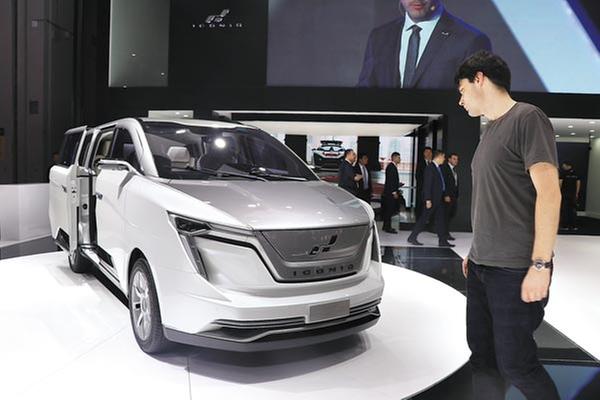New energy competition heats up
 |
| A visitor looks at an Iconiq Seven multi-purpose vehicle at the Shanghai auto show on April 19. [Photo provided to China Daily] |
Auto entrepreneurs descended on Shanghai last week for the biennial motor show, bringing an array of electric and connected vehicles that they hope will tap the constant growth opportunities in the Chinese market.
While premium new energy vehicle models were banking on the tradeshow to attract attention, vibrant Chinese startups are picking out their varied paths to capture the imagination of younger customers who heavily rely on the internet.
The new players are competing to deliver a memorable experience and empower buyers in their 20s or 30s, according to Accenture Consulting Greater China.
The Chinese-investor-backed Iconiq Motors is exploring a strategy focused on unique customer experiences with the world's first electric multi-purpose vehicle, the Iconiq Seven.
"Customers' individualized needs are not met by the offers currently available on the market," said Bruno Lambert, CEO of Iconiq Motors. "We are taking steps ahead of the current market and have the next level of products ready for the coming penetration of MPVs."
The Iconiq Seven, designed and developed by the W Motors team that produced the Lykan and Fenyr models, features individualized infotainment systems behind each passenger's personal touch screen.
The management team believes its business model has established the right mindset for their new brand in a segment with barely any competition, instead of the heating up SUV segment.
Lamert said: "We have observed growing demand for MPVs and customers are moving to electric vehicles." The Iconiq Seven has received thousands of preorders so far, years before the mass-produced vehicles are scheduled to roll off the line in 2019.
These deals were made by mobility service providers-both in China and overseas-that intend to impress customers who are not satisfied by the currently popular Buick GL8, Honda Odyssey and Toyota Alphard.
Conversely, some individual consumer-targeted startups are striving to lure their first batch of buyers, in the hope of attracting preorders from those interested in their prototypes.
The internet-funded NextEV began promoting its brand by sponsoring Formula E in 2015. Later, it moved on to developing a high-performance electric sport car with institutes in Munich, Silicon Valley and London, refreshing the Nurburgring North record for e-cars last year.
Now the high-profile company has firmly put its feet on the ground with an intelligent electric SUV that will be premium but affordable for the public, weeks after it agreed a mass-production contract with Chinese automaker Changan Automobile.
John Shen, managing director of Accenture Strategy Greater China, said: "The new players outsourcing production to conventional carmakers are arranging their business layout toward the future information business."
"They are an asset-light business model that leverages the limited investment, which might catch more investors easily," he continued.
This approach seems to be becoming increasingly popular among startups.
Little-known carmaker Singulato Motors will also outsource its premium electric SUV to an original manufacturer.
The company says it is centered on the futuristic operating system, the brain of an intelligent car.
Shen pointed out that the young companies' disruptive revolution will follow the positive kick start from their prototypes for future mobility.
He added they will receive positive feedback from investors and attract partners, including original manufacturers to set production in motion.

